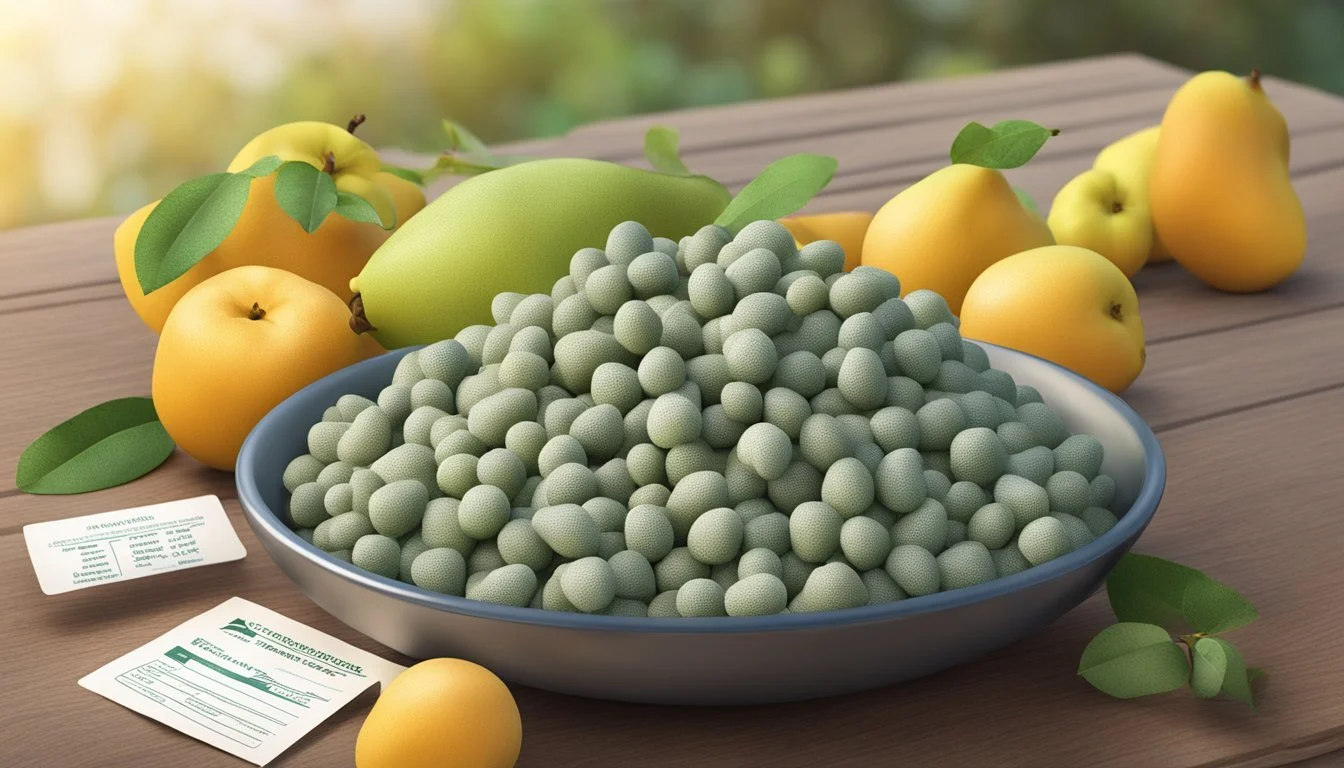What are the Health Benefits of Sorb Fruit?
Unveiling Nutritional Secrets
Sorb fruit (What wine goes well with fruit?), also known as rowan berries, is a type of fruit that often doesn't make headlines but holds a number of health benefits worth noting. Rowan berries are rich in vitamin C, an essential nutrient that contributes to immune system health. Vitamin C acts as a natural antioxidant, potentially reducing the impact of oxidative stress on the body. This nutrient is also vital for the production of white blood cells, which are crucial for fighting off infections.
Apart from their immune-boosting properties, rowan berries contain other beneficial compounds that may enhance overall health. Their consumption can offer anti-inflammatory effects, and they're believed to have antiviral qualities as well. The phytonutrients present in these berries contribute to a well-rounded diet that supports general wellbeing.
While rowan berries can be eaten raw, they are often processed into various forms to mitigate their naturally bitter taste. Sorbets made from rowan berries not only provide a delightful, refreshing dessert option but also keep the calorie count considerably low. This makes rowan berries-based sorbet an excellent choice for those who are watching their weight or seeking a healthier alternative to traditional high-sugar desserts.
Nutritional Profile and Constituents
Sorbus fruit, commonly known as rowanberry or mountain ash berry, boasts a nutritious composition dense in essential elements and health-promoting phytonutrients. This section will examine its rich vitamins and minerals, along with its macronutrient content, which includes dietary fiber, providing a well-rounded picture of its nutritional value.
Vitamins and Minerals
Sorbus fruits are an excellent source of vitamin C, a potent antioxidant which is crucial for the immune system, skin health, and iron absorption. They contain appreciable amounts of vitamin E, which assists in combating oxidative stress and maintaining healthy skin.
The fruit is also rich in essential minerals such as potassium, vital for maintaining normal blood pressure; magnesium, which supports hundreds of enzyme reactions; and calcium, important for bone health. Trace minerals found in the fruit, like iron, are integral for blood formation and function.
Dietary Fiber and Macronutrients
The rowanberry offers a considerable amount of dietary fiber, which supports digestive health and assists with maintaining a feeling of fullness. As for macronutrients, while sorbus fruit contains mainly carbohydrates in the form of natural sugars, it also provides a modest level of proteins and fats. The low presence of saturated fats makes it heart-friendly, and the presence of fatty acids, like linoleic acid, contributes to overall health maintenance.
Notably, the fatty acid profile revealed palmitic acid as the most commonly occurring saturated fat, and linoleic acid as the major polyunsaturated fat, which are essential for cellular health. The phytochemical composition, rich in polyphenolic compounds and phytonutrients, further enhances its profile as these compounds are known for their antioxidant properties, contributing to the body's ability to counteract oxidative stress.
Health Benefits and Therapeutic Uses
Sorbus, commonly known as rowan or mountain ash, is recognized for its diverse array of polyphenolic compounds that contribute to its health benefits. These compounds demonstrate an ability to interface positively with various bodily systems.
Cardiovascular Health
Rowan berries can support cardiovascular health by maintaining healthy blood pressure and strengthening blood vessels. Their high levels of antioxidants mitigate the oxidative stress that can lead to heart disease. Quercetin, a flavonoid found in Sorbus fruit, helps maintain the flexibility of arteries and may prevent the oxidation of low-density lipoprotein (LDL) cholesterol, a key factor in the development of atherosclerosis.
Digestive Well-being
The regular intake of Sorbus berries may aid digestive health due to their fiber content. Fiber acts as a natural laxative, reducing constipation and maintaining smooth digestion. The presence of beneficial compounds in Sorbus has been linked to promoting a healthy gut flora, akin to the effects of probiotics. This, in turn, supports overall digestive well-being.
Immune System Support
The antioxidants and vitamins within Sorbus spp. bolster the immune system by enhancing the function of white blood cells and providing anti-inflammatory benefits. These anti-inflammatory properties help in reducing chronic inflammation, which is a known precursor for numerous diseases.
Anti-cancer Potential
Research has suggested that certain chemopreventive agents in Sorbus may contribute to the fruit's anti-cancer potential. These include various phytochemicals that target and suppress the proliferation of cancer cells and protect against DNA damage by free radicals. However, it is essential to note that while Sorbus contains beneficial compounds, it is not a cure for cancer and should be consumed as part of a balanced diet to support overall health.
Traditional and Contemporary Uses
The sorb fruit, from the service tree and its relatives within the Rosaceae family, has held a prominent place in both culinary applications and folk medicine throughout history. Its uses span from nutrient-rich foods to remedies for various ailments.
Culinary Applicationssorb fruit
Sorb fruit, including those from the service tree (Sorbus domestica) and the mountain ash (often referred to as rowan berries), has a rich history in culinary traditions. The pomes from these trees are not only consumed fresh but also processed into various forms such as:
Teas
Juices
Jams
Jellies
Pies
In cooking, the fruit is often prepared in a manner to reduce its natural astringency, which results in a pleasantly flavored delicacy.
Folk Medicine
In folk medicine, the various components of sorb and related trees have been utilized with a focus on their potential health benefits. The use of rowan berries in particular has been noteworthy in the treatment of conditions such as:
Diarrhea: Dried and ground fruit used for its astringent properties.
Sore throats and hoarseness: Berries used as a treatment, often turned into teas.
Rheumatism and arthritis: Decoctions from the bark or fruit used to ease symptoms.
Scurvy: The vitamin C rich berries served as a remedy.
Kidney disease: Extracts from the fruit or leaves used for their perceived health benefits.
Today, these traditional applications have given way to a continued interest in the fruit's nutritional and health-supporting properties. A number of the traditional applications are being explored scientifically for their efficacy and potential therapeutic uses.
Adverse Effects and Considerations
When considering the health profile of sorb fruit, it's important to understand the potential side effects and interactions. Sorb fruit, also known as sorbitol when used as a sugar substitute, can cause gastrointestinal issues in some individuals.
Side Effects:
Gastrointestinal discomfort: Overconsumption can lead to bloating, gas, and diarrhea.
Dehydration and electrolyte imbalances: Excessive intake might cause fluid loss through diarrhea, risking dehydration.
Hyperglycemia: Though often used by those managing blood sugar levels, sorbitol might still lead to blood glucose spikes.
Medications:
Medication Absorption: Sorbitol may affect the absorption rates of some oral medications, potentially altering their efficacy.
Toxicity:
Toxicity is generally low, but overconsumption can lead to digestive distress and adverse metabolic effects.
Interactions:
Insulin: Individuals on insulin should monitor blood sugar closely as sorbitol can impact glucose levels.
Diuretics or laxatives: Combining sorbitol with these can worsen dehydration or electrolyte imbalances.
Individuals are encouraged to consume sorb or sorbitol-containing products in moderation and be vigilant of their body's reactions, especially if they have underlying health conditions or are taking other medications. If adverse effects are experienced, reducing intake or consulting a healthcare professional is advisable.
Frequently Asked Questions
In this section, several common queries regarding the health benefits of black currants are addressed, offering evidence-based insights into how this fruit can contribute to overall wellness.
How can consuming black currants improve skin health?
Black currants are rich in Vitamin C and antioxidants, which can aid in collagen production and combat skin aging. Their anti-inflammatory properties may also help in reducing skin conditions such as eczema.
In what ways do black currants affect eye health?
They contain high levels of anthocyanins, which have been shown to improve night vision and reduce eye strain. Regular consumption of black currants can also support the overall health of the retina.
What are the benefits of black currants for individuals with diabetes?
Black currants have a low glycemic index and are high in fiber, which helps in regulating blood sugar levels. The fruit's antioxidative properties can also protect against complications associated with diabetes.
What advantages do black currant supplements offer?
Supplements that contain black currant extract can provide a concentrated dose of the fruit's nutrients, potentially benefiting those who require higher intake of antioxidants and vitamins due to health conditions.
What are the health benefits of eating dry black currants?
Dried black currants are a good source of iron and concentrated antioxidants. They are also a convenient snacking option that retains most of the fresh fruit's nutrients.
How does including black currants in your diet benefit hair?
The high vitamin and mineral content in black currants, including Vitamin C, Vitamin B5, and antioxidants, can support hair growth and strength, and may also contribute to a healthy scalp.






